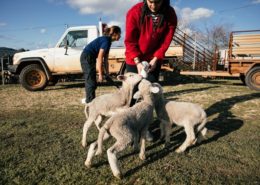Animal husbandry is a branch of agriculture concerned mainly with animals raised for meat, milk, eggs, fibre or other products. A combination of animal anatomy and physiology, this course is ideal for anyone working with or keen to increase their knowledge of animals, including cattle, goats, pigs, sheep and poultry.
The Certificate of Animal Husbandry (Advanced) is an online professional development program that follows on from the Certificate of Animal Husbandry and mainly focuses on animal health.
In this animal husbandry online course, you will also learn about common diseases that affect farm animals, their signs and symptoms, treatment, and causes, including wounds, inflammation and cell changes.
On completion of this course, you will have a solid introduction to animal health, which will raise your awareness of the animal husbandry industry and create opportunities for employment or managing your own business.
Course Structure
Animal Husbandry II
Unit 1 – Introduction to Animal Health
- The healthy animal
- Normal vital signs
- Psychological values
- Causes of ill health
- Preventing ill health
Unit 2 – Signs and Symptoms of Diseases
- Recognising ill health
- Conducting an examination
- Handling small animals
- Types pf restraints
- Restraining a horse
- Sheep handling facilities
- Dipping facilities
- Issues with dipping
- Drenching
Unit 3 – Disease Classification
- Viruses
- Bacteria
- Characteristics of bacteria
- Protozoa
- Parasites
- Disease types in beef cattle
- Viral diseases
- Bacterial diseases
- Parasitic diseases
- Protozoal diseases
- Other ailments
- Exotic diseases
- Diseases in sheep
Unit 4 – Causes and Diagnosis of Disease
- Routine disease investigation
- Examining cattle
- Examining a horse
- Good health in a horse
- Signs a horse is off colour
- Signs of a very ill horse
- Diagnosing a disease
- Blood smears
- Tick control
Unit 5 – Treatment of Disease
- Vaccination
- Types of vaccine
- Vaccination programs
- Animal first aid kit
- Tetanus antiserum
- Animal nursing
- Quarantine
- Slaughter
- Post-mortem
- Disease prevention in cattle
- Disease prevention in sheep
- The sheep farmers medicine chest
- Sheep parasites
- Preventing disease in horses
- Nursing sick horses
- Isolation and biosecurity
Unit 6 – Inflammation
- The inflammatory response
- Causes and types of inflammation
- Location and changes in inflammation
- Symptoms of inflammation
- Treatments
Unit 7 – Fever and Immunity
- Fever
- Temperature related disorders
- Temperature regulation
- Effect of temperature on enzymes
- Causes of fever
- Immunity
Unit 8 – Tissue Repair
- Animal tissue
- Tissue repair process
- Wound healing
- Bone repair
- Using bandages
- Horse tissue damage
Unit 9 – Wounds
- Types of wounds
- First aid treatments
- Wound management
- Specific types of wounds
- Goats and sheep – horn injuries
- Bandaging horses
- Types of bandaging
Unit 10 – Cell Changes
- When do cells change?
- Neoplasms, tumours and cancers
- The course of an infectious disease
Study Hours
Estimated duration 50 hours
Course Delivery and Start
Start anytime, self-paced and 100% online
Assessment
Assessment will be comprised of written exercises, including short-answer questions, reflective tasks, short reports and/or projects. There are no examinations or due dates for assessment. As a result, you can complete training in your own time and at your own pace with the assistance of unlimited tutor support.
Testimonials
Graduation
A Certificate of Attainment and Statement of Results will be issued upon successful completion of this course.
How to Enrol
Enrol Online: Click Enrol Now (Credit Card) or Enrol Now (Internet Banking/BPAY)
Enrol via Live Chat (Business Hours)
Enrol via Telephone 1300 76 2221 (Business Hours)
Enrol via Purchase Order/Tax Invoice
Enrolling Multiple Staff?
To enrol multiple staff, please complete the Employer Enrolment Form. We’ll be in touch within 60 minutes during business hours!
Payment Options
Visa, Mastercard, BPAY and Direct Deposit.
Course FAQs
Why Choose Australian Online Courses?
- Professional development that is widely recognised and respected;
- Improve your employment opportunities;
- Study online, anywhere via our elearning system;
- High-quality professional development programs written by industry experts;
- All course materials provided online – no textbooks to buy;
- Unlimited tutor support via email;
- We offer twelve (12) months’ access, with extensions available upon application (fees apply);
- Course may be tax deductible; see your tax advisor.
Are there any entry requirements or pre-requisites?
To study online with Australian Online Courses you will need a computer (desktop PC/laptop) running a current/updated operating system with reliable high-speed internet access. You will need to use the Google Chrome browser to access your course.
Are there any computer requirements?
To study online with Australian Online Courses you will need a computer (desktop PC/laptop) running a current/updated operating system with reliable high-speed internet access. You will need to use the Google Chrome browser to access your course.
When can I start this course?
You can start within 60 minutes during business hours when you enrol and pay in full with a credit card!
Credit card: Within 60 mins during business hours.
BPAY: Within 1-2 working days.
Internet Banking: Within 1-2 working days.
Cheque/Money Order: Upon receipt of mailed cheque.
How is this course delivered?
This course is delivered online via our easy-to-navigate Learning Management System (LMS), where you will discover interactive online learning/written content, resources and assessment.
Do I need to attend classes or undertake any work placements?
No. All courses are delivered online via our LMS and there are no work placement requirements in this course.
What support can I expect from Australian Online Courses?
Unlimited tutor support is available throughout your studies via email only during business hours Monday to Friday. Our Administrative team are available Monday to Friday via email, live chat and telephone.
I am an international student. Can I enrol into this course?
Yes! We accept enrolments from individuals both within Australia and internationally; location is no barrier to entry into our programs.
Career Pathways
Future growth
Strong
Unemployment
Low
- Those working or wanting to work with animals
- Volunteer animal workers










